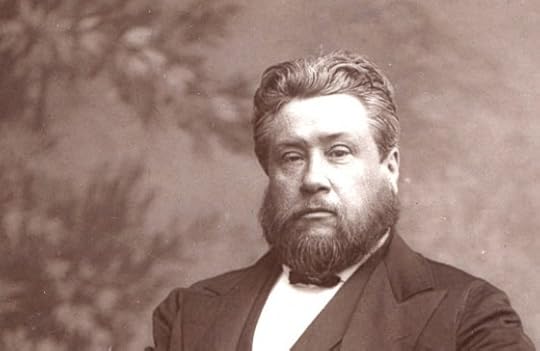Justin Taylor's Blog, page 139
September 9, 2013
To Whom Much Is Given, Much Will Be Required
Jonathan Edwards:
We are in some respects under far greater advantages for gaining knowledge, now in these latter ages of the church, than Christians were formerly; especially by reason of the art of printing, of which God has given us the benefit, whereby Bibles and other books of divinity are exceedingly multiplied, an persons may now be furnished with helps for the obtaining of Christian knowledge, at a much easier and cheaper rate than they formerly could.
—”The Importance and Advantage of Divine Truth” (1739), in The Sermons of Jonathan Edwards: A Reader, ed. Wilson K. Kimnach, Kenneth P. Minkema, and Douglas A. Sweeney (New Haven/London: Yale University Press, 1999), 46.
September 8, 2013
September 7, 2013
Why David McCullough Still Types All of His Books on a Typewriter
 From a 1991 Paris Review interview (which is worth reading in full):
From a 1991 Paris Review interview (which is worth reading in full):
I write on an old Royal typewriter, a beauty! I bought it secondhand in 1964, before I started The Johnstown Flood, and I’ve written all my books on it. It was made about 1941 and it works perfectly. I have it cleaned and oiled about once every book and the roller has to be replaced now and then. Otherwise it’s the same machine. Imagine—it’s more than fifty years old and it still does just what it was built to do! There’s not a thing wrong with it.
I love putting paper in.
I love the way the keys come up and actually print the letters.
I love it when I swing that carriage and the bell rings like an old trolley car.
I love the feeling of making something with my hands.
People say, But with a computer you could go so much faster. Well, I don’t want to go faster. If anything, I should go slower. I don’t think all that fast.
They say, But you could change things so readily. I can change things very readily as it is. I take a pen and draw a circle around what I want to move up or down or wherever and then I retype it.
Then they say, But you wouldn’t have to retype it. But when I’m retyping I’m also rewriting.
And I’m listening, hearing what I’ve written. Writing should be done for the ear. Rosalee reads aloud wonderfully and it’s a tremendous help to me to hear her speak what I’ve written. Or sometimes I read it to her. It’s so important. You hear things that are wrong, that call for editing.
September 6, 2013
A New Router that Stops Pornography from Going onto Your Computer or Device
 Brian Howard reviews a new router, Pandora’s Hope, that looks quite promising.
Brian Howard reviews a new router, Pandora’s Hope, that looks quite promising.
We have four kids that range in age from 8 years old to 14 years old. Between the 6 of us, we have a dozen different devices connected to the web in our home. For years we have used software filters or accountability software to screen out porn. When we recently learned about a new device that promises to keep Internet Porn out of our house, we were excited to give it a try. The device is a router manufactured by Pandora’s Hope. The company promises that it’s router is easy to set up, works on computers and mobile devices, stops pornography at the “Gateway”, and causes no noticeable loss of browser speed. Today, I plugged in my new Pandora’s Hope Router for the first time.
Read his whole review, or go to the company’s home page.
Performing Shakespeare’s Plays in the Original Accent and Pronunciation
A Conversation with Historian David Hollinger on Revisiting Protestant Liberalism
 Al Mohler recently had a substantive, fascinating conversation with Professor David Hollinger, the Preston Hotchkis Professor of History at the University of California at Berkeley and the author of After Cloven Tongues of Fire: Protestant Liberalism in Modern American History (Princeton University Press, 2013).
Al Mohler recently had a substantive, fascinating conversation with Professor David Hollinger, the Preston Hotchkis Professor of History at the University of California at Berkeley and the author of After Cloven Tongues of Fire: Protestant Liberalism in Modern American History (Princeton University Press, 2013).
You can read the transcript or listen to the audio.
A couple of concepts you’ll come away with from this interview is that liberal Protestants achieved a cultural victory but an organizational defeat, and that the twin concepts of “cognitive demystification” and “demographic diversification” are important factors to remember in the development of America and religion.
Abuse Does Not Take Away Use
Derek Rishmawy’s helpful piece at TGC opens with this observation:
In my online forays, I’ve observed it’s increasingly common for people to explicitly reject a doctrine, or the notion of orthodox teaching in general, on the basis of its abuse. You’ll often read something along these lines: “I grew up in a church that had a heavy emphasis on doctrine X (depravity, judgment, sola scriptura, etc.). My pastors and elders used that doctrine to berate people, cow them into submission, or excuse horrible evils.” So now, whenever they hear doctrine X, they can’t accept it because they know (feel) it’s a tool being used to control them or bring about another harmful result. In fact, some will go further and elevate this reaction into a principle of theological methodology: if a doctrine could be or has been used to hurt or damage, it must be rejected out of hand.
Here’s the heart of his article:
One of the most important rules I’ve learned in my theological studies is abusus non tollit usum—”abuse does not take away use.” Basically, fire can destroy, but it’s also good for cooking or keeping your home warm; an oxygen mask can still save your life, even if someone choked you with one; scalpels still cut out cancer, even if someone got injured with one. In the same way, doctrines can still be good, true, beautiful, and helpful despite the ways they’ve been abused or misconstrued in the past.
You can read the whole thing here.
September 5, 2013
A New Student Mission Conference
@TripLee116 narrates a video introducing the Cross Conference, coming this December to Louisville:
CROSS exists for the global purpose of magnifying the kingly majesty of Jesus Christ. Our focus is on all the unreached peoples of the world where Jesus is not worshiped as God and Savior.
To that end CROSS aims to mobilize students for the most dangerous and loving cause in the universe: rescuing people from eternal suffering and bringing them into the everlasting joy of friendship with Jesus.
Join us Dec. 27-30, 2013 in Louisville, KY (register at crosscon.com).
Spurgeon, Hagiography, and History
Charles Spurgeon often worked 18 hours a day.
His collected sermons fill 63 volumes (the largest set by a single author in church history).
He read six books a week and could recall their contents.
He read through The Pilgrim’s Progress more than 100 times.
14,460 people were added to his church’s membership, and he did most of the membership interviews himself.
He trained 900 men to the pastorate.
He founded an orphanage.
He edited a magazine.
He produced more than 140 books.
He received 500 letters a week to respond to.
More than 25,000 copies of his sermons were printed each week.
He often preached 10 times a week in various churches.
He did all this while suffering from gout, rheumatism, and Bright’s disease—living only to the age of 57.
And his wife was ill most of that time.
In a new interview with Tom Nettles, author of the acclaimed new biography, Living by Revealed Truth: The Life and Pastoral Theology of Charles Haddon Spurgeon, Matt Smethurst asks:
How is this really possible, even for a perfectly fit man? Is some of this hagiography? Was Spurgeon a workaholic?
Nettles responds:
This isn’t hagiography; it’s simple fact. One could say, “Do the math.” To overestimate how well he did each thing would be hagiography, but to note he actually did them is true.
His book reviews were pertinent but not, for the most part, extended critical reviews.
Sometimes sermon preparation overwhelmed him, for he was unable to use sermons more than once due to their immediate availability to the public through print.
He had effective, talented, and devoted deacons and elders who aided him in every aspect of his ministry. They took on much of the burden of initially interviewing new converts and prospective members and preparing the way for Spurgeon’s final interview.
His brother did almost all the baptizing, and the discipline of the congregation was largely in the elders’ hands.
In letter writing Spurgeon was the master of short but witty, sensitive, and relevant responses. He also had a personal secretary who aided in his daily literary production, as well as devoted publishers who wanted everything he spoke or wrote.
Read the whole interview here.
If God Did That, How Much More Will He Do This?
When we read a passage like Romans 8:31-35, it’s helpful to remember that “rhetorical questions” are indicatives (statements of reality) expressed in a heightened (rhetorically powerful) way.
Expressed in simple indicatives, the passage would look something like this:
If God is for us, no one can be against us.
He who did not spare his own Son but gave him up for us all will surely also with him graciously give us all things.
No one shall bring any charge against God’s elect.
It is God who justifies; No one can condemn.
No one shall separate us from the love of Christ.
Tribulation, or distress, or persecution, or famine, or nakedness, or danger, or sword will not separate us from the love of Christ.
But God inspired Paul to put it this more emotionally charged and lyrical way:
If God is for us, who can be against us?
He who did not spare his own Son but gave him up for us all, how will he not also with him graciously give us all things?
Who shall bring any charge against God’s elect?
It is God who justifies. Who is to condemn? . . .
Who shall separate us from the love of Christ?
Shall tribulation, or distress, or persecution, or famine, or nakedness, or danger, or sword?
Seeing it in indicatives takes some of the punch out of it. But it does remind us that these are not mere questions, but emphatic declarations of reality in the form of rhetorical questions.
And note the form of Romans 8:32—
He who did not spare his own Son but gave him up for us all,
how will he not also with him graciously give us all things?
It is not just a statement, or a rhetorical question, but an argument. More specifically, it is an a fortiori argument (Latin, “from the stronger”). The idea is that if A is true, we can infer that B is even more certainly true. The argument is often expressed in the Bible as “If A, how much more B!”
Here are two examples from the lips of Jesus:
Luke 12:28, “But if God so clothes the grass, which is alive in the field today, and tomorrow is thrown into the oven, how much more will he clothe you, O you of little faith!”
Matthew 7:11, “If you then, who are evil, know how to give good gifts to your children, how much more will your Father who is in heaven give good things to those who ask him!”
The argument of Romans 8:32 is that if God did the hardest thing in the world, giving up his own Son, and if he did that as a gift for us, then it will be easy and logical for him to give us everything we need in Christ.
John Flavel (c. 1627-1691) captures the heart of this verse well:
How is it imaginable that God should withhold, after this, spirituals or temporals, from his people?
How shall he not call them effectually, justify them freely, sanctify them thoroughly, and glorify them eternally?
How shall he not clothe them, feed them, protect and deliver them?
Surely if he would not spare this own Son one stroke, one tear, one groan, one sigh, one circumstance of misery, it can never be imagined that ever he should, after this, deny or withhold from his people, for whose sakes all this was suffered, any mercies, any comforts, any privilege, spiritual or temporal, which is good for them.
What freedom it is to know that nothing for my ultimate good will ever be withheld because of what Christ accomplished for me on the cross. And it’s all of grace.
Justin Taylor's Blog
- Justin Taylor's profile
- 44 followers




